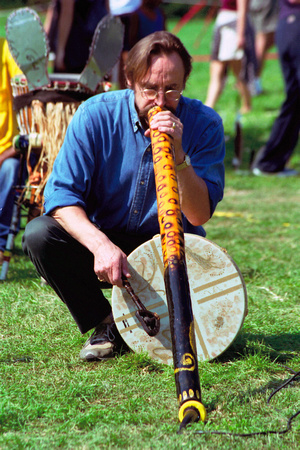1290: Aboriginal Didgeridoo
Authentic Aboriginal didgeridoos produced in traditionally-oriented communities in northern Australia are usually made from hardwoods, especially the various eucalyptus species that are endemic to the region. The main trunk of the tree is often harvested, though branches are sometimes used as well. Aboriginal craftsmen spend considerable time searching for a suitable tree to make into a didgeridoo. The difficult part is in finding a tree that has been suitably hollowed out by termites. If the hollow is too big or too small, it will make a poor quality instrument. Sometimes a native bamboo or pandanus are used as well.
When a suitable tree is found and cut down, a length of the main trunk or a segment of a branch is removed that will become the didgeridoo. The bark is taken off, the ends trimmed, and some shaping of the exterior then results in a finished instrument. This instrument may be painted or left undecorated. A rim of beeswax may be applied to the mouthpiece end.
Cylindrical plastic pipes are sometimes used to make didgeridoos. They are cheap to buy from a hardware store, are light-weight, and can be easily tuned to any desired key, but they are rated as relatively poor instruments by experienced players.
Didgeridoos are also made from PVC piping. These generally have an 1.5" to 2" inside diameter, 100cm length. The mouthpiece is often made of the traditional beeswax, or duct tape.
The didgeridoo is played with continuously vibrating lips to produce the drone while using a special breathing technique called circular breathing. This requires breathing in through the nose whilst simultaneously expelling air out of the mouth using the tongue and cheeks. By use of this technique, a skilled player can replenish the air in his lungs, and with practice can sustain a note for as long as desired. Recordings exist of modern didgeridoo players playing continuously for more than forty minutes, and some currently unsubstantiated claims peg times over one hour.


